Intro
Lichen sclerosus symptoms include itching, pain, and skin thinning. Effective treatment options, such as topical creams and lifestyle changes, can manage symptoms and prevent complications, improving quality of life for those affected by this chronic skin condition.
Lichen sclerosus is a rare and chronic skin condition that affects the genital and anal areas, causing thinning, patchy, and wrinkled skin. It is more common in women, but can also occur in men and children. The symptoms of lichen sclerosus can be uncomfortable and painful, making it essential to seek medical attention for proper diagnosis and treatment. In this article, we will delve into the symptoms, causes, and treatment options for lichen sclerosus, providing you with a comprehensive understanding of this condition.
The symptoms of lichen sclerosus can vary from person to person, but common signs include itching, burning, and pain in the affected area. The skin may become thin, white, and patchy, with wrinkles and creases. In severe cases, the skin can tear, causing bleeding and scarring. Women with lichen sclerosus may experience vaginal dryness, pain during sex, and difficulty urinating. Men with the condition may experience pain during urination, difficulty starting to urinate, and a decreased urine stream. Children with lichen sclerosus may experience itching, pain, and difficulty urinating.
Lichen sclerosus can have a significant impact on a person's quality of life, causing emotional distress, anxiety, and depression. The condition can also lead to social isolation, as individuals may feel embarrassed or ashamed of their symptoms. It is essential to seek medical attention if you are experiencing any symptoms of lichen sclerosus, as early diagnosis and treatment can help alleviate symptoms and prevent long-term complications.
What is Lichen Sclerosus?
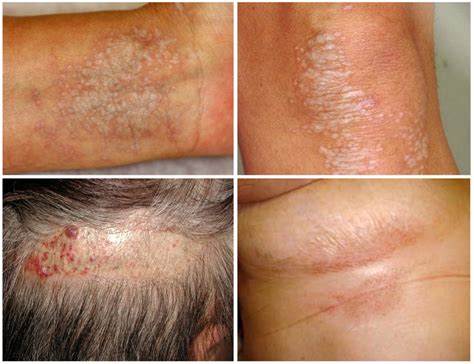
Lichen sclerosus is a chronic skin condition that affects the genital and anal areas. The exact cause of the condition is unknown, but it is thought to be related to an overactive immune system, hormonal imbalances, and genetic predisposition. Lichen sclerosus is not contagious and cannot be spread through sexual contact. The condition can occur at any age, but it is most common in postmenopausal women.
Causes and Risk Factors
The exact cause of lichen sclerosus is unknown, but several factors can increase the risk of developing the condition. These include: * Hormonal imbalances: Changes in hormone levels, such as those that occur during menopause, can increase the risk of lichen sclerosus. * Genetic predisposition: Individuals with a family history of lichen sclerosus are more likely to develop the condition. * Autoimmune disorders: Conditions such as thyroid disease, vitiligo, and alopecia areata can increase the risk of lichen sclerosus. * Infections: Bacterial, viral, and fungal infections can trigger the onset of lichen sclerosus.Symptoms of Lichen Sclerosus
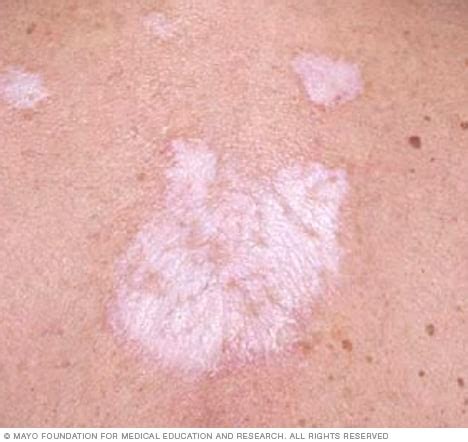
The symptoms of lichen sclerosus can vary from person to person, but common signs include:
- Itching, burning, and pain in the affected area
- Thinning, patchy, and wrinkled skin
- White, pink, or red skin lesions
- Scarring and skin tears
- Vaginal dryness and pain during sex (in women)
- Difficulty urinating and a decreased urine stream (in men)
- Itching, pain, and difficulty urinating (in children)
Diagnosis of Lichen Sclerosus
Diagnosing lichen sclerosus can be challenging, as the symptoms can be similar to those of other skin conditions. A doctor will typically perform a physical examination, take a medical history, and conduct tests to rule out other conditions. These tests may include: * Biopsy: A skin biopsy can help confirm the diagnosis of lichen sclerosus. * Blood tests: Blood tests can help rule out other conditions, such as infections or autoimmune disorders. * Urine tests: Urine tests can help rule out urinary tract infections or other conditions that may be causing symptoms.Treatment Options for Lichen Sclerosus
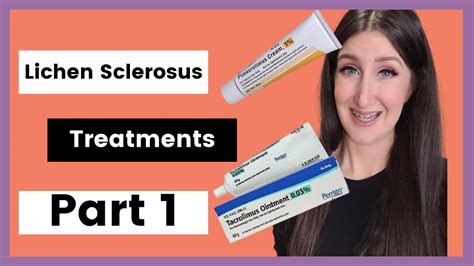
Treatment for lichen sclerosus typically involves topical corticosteroids, which can help reduce inflammation and alleviate symptoms. Other treatment options may include:
- Topical immunomodulators: These medications can help modify the immune system's response and reduce inflammation.
- Hormone replacement therapy: Hormone replacement therapy may be prescribed for postmenopausal women to help alleviate symptoms.
- Pain relief medications: Pain relief medications, such as acetaminophen or ibuprofen, can help manage pain and discomfort.
- Surgery: In severe cases, surgery may be necessary to remove scar tissue or repair damaged skin.
Self-Care and Lifestyle Changes
In addition to medical treatment, self-care and lifestyle changes can help manage symptoms and prevent complications. These include: * Practicing good hygiene: Keeping the affected area clean and dry can help prevent infections and reduce symptoms. * Avoiding irritants: Avoiding irritants, such as soap, detergent, and fabric softener, can help reduce inflammation and alleviate symptoms. * Wearing loose clothing: Wearing loose, comfortable clothing can help reduce friction and prevent skin irritation. * Managing stress: Managing stress through techniques such as meditation, yoga, or deep breathing can help reduce symptoms and improve overall well-being.Complications of Lichen Sclerosus
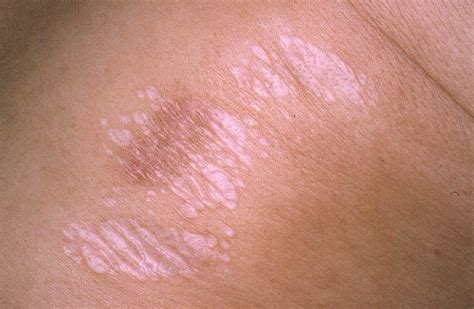
If left untreated, lichen sclerosus can lead to several complications, including:
- Scarring and skin tears: Untreated lichen sclerosus can lead to scarring and skin tears, which can be painful and increase the risk of infection.
- Infections: Bacterial, viral, and fungal infections can occur in individuals with lichen sclerosus, particularly if the skin is broken or irritated.
- Urinary tract problems: Lichen sclerosus can increase the risk of urinary tract problems, such as urinary retention, incontinence, and recurrent infections.
- Cancer: In rare cases, lichen sclerosus can increase the risk of skin cancer, particularly squamous cell carcinoma.
Preventing Complications
Preventing complications of lichen sclerosus requires early diagnosis and treatment, as well as self-care and lifestyle changes. These include: * Practicing good hygiene: Keeping the affected area clean and dry can help prevent infections and reduce symptoms. * Avoiding irritants: Avoiding irritants, such as soap, detergent, and fabric softener, can help reduce inflammation and alleviate symptoms. * Wearing loose clothing: Wearing loose, comfortable clothing can help reduce friction and prevent skin irritation. * Managing stress: Managing stress through techniques such as meditation, yoga, or deep breathing can help reduce symptoms and improve overall well-being.Living with Lichen Sclerosus
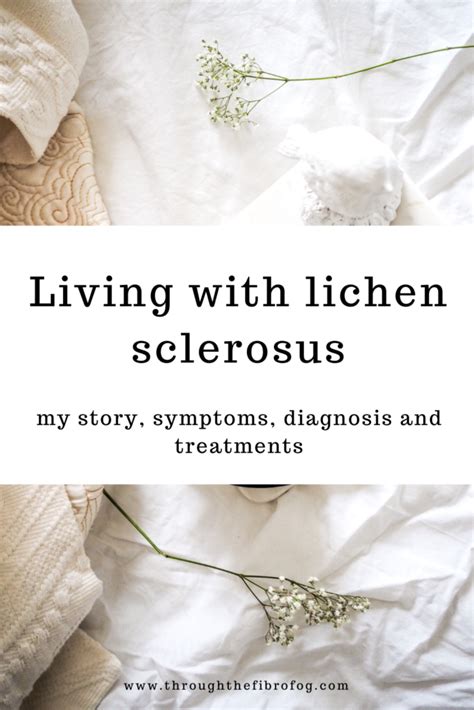
Living with lichen sclerosus can be challenging, but there are several ways to manage symptoms and improve quality of life. These include:
- Seeking support: Joining a support group or talking to a therapist can help individuals cope with the emotional and psychological aspects of lichen sclerosus.
- Practicing self-care: Practicing self-care, such as taking warm baths, using gentle cleansers, and wearing comfortable clothing, can help reduce symptoms and improve overall well-being.
- Staying informed: Staying informed about lichen sclerosus, its symptoms, and its treatment options can help individuals make informed decisions about their care.
- Advocating for oneself: Advocating for oneself, such as asking questions, seeking second opinions, and expressing concerns, can help individuals receive the best possible care.
Coping with Emotional Distress
Coping with the emotional distress of lichen sclerosus requires a comprehensive approach that addresses physical, emotional, and psychological needs. This can include: * Seeking support: Joining a support group or talking to a therapist can help individuals cope with the emotional and psychological aspects of lichen sclerosus. * Practicing stress-reducing techniques: Practicing stress-reducing techniques, such as meditation, yoga, or deep breathing, can help reduce symptoms and improve overall well-being. * Engaging in activities: Engaging in activities that bring joy and fulfillment can help individuals cope with the emotional distress of lichen sclerosus.What is the main cause of lichen sclerosus?
+The exact cause of lichen sclerosus is unknown, but it is thought to be related to an overactive immune system, hormonal imbalances, and genetic predisposition.
What are the symptoms of lichen sclerosus?
+The symptoms of lichen sclerosus can vary from person to person, but common signs include itching, burning, and pain in the affected area, thinning, patchy, and wrinkled skin, and scarring and skin tears.
How is lichen sclerosus treated?
+Treatment for lichen sclerosus typically involves topical corticosteroids, which can help reduce inflammation and alleviate symptoms. Other treatment options may include topical immunomodulators, hormone replacement therapy, pain relief medications, and surgery.
Can lichen sclerosus be prevented?
+While there is no sure way to prevent lichen sclerosus, practicing good hygiene, avoiding irritants, and managing stress can help reduce the risk of developing the condition.
What are the complications of lichen sclerosus?
+If left untreated, lichen sclerosus can lead to several complications, including scarring and skin tears, infections, urinary tract problems, and cancer.
In conclusion, lichen sclerosus is a chronic skin condition that requires early diagnosis and treatment to manage symptoms and prevent complications. By understanding the causes, symptoms, and treatment options for lichen sclerosus, individuals can take control of their condition and improve their quality of life. If you are experiencing symptoms of lichen sclerosus, do not hesitate to seek medical attention. With the right treatment and self-care, it is possible to manage symptoms and live a fulfilling life. We encourage you to share your experiences and ask questions in the comments section below, and to share this article with others who may be affected by lichen sclerosus.
